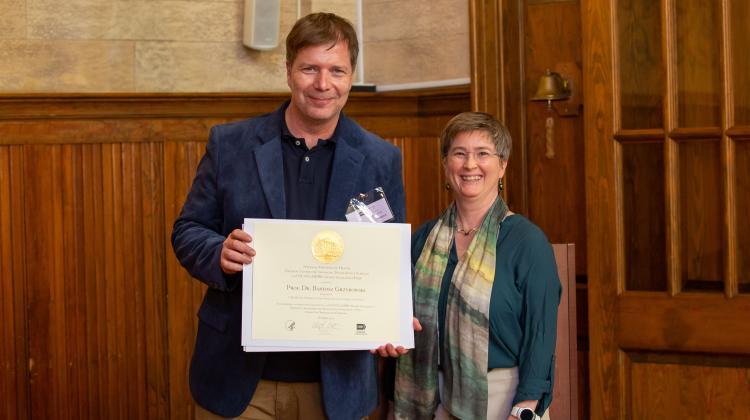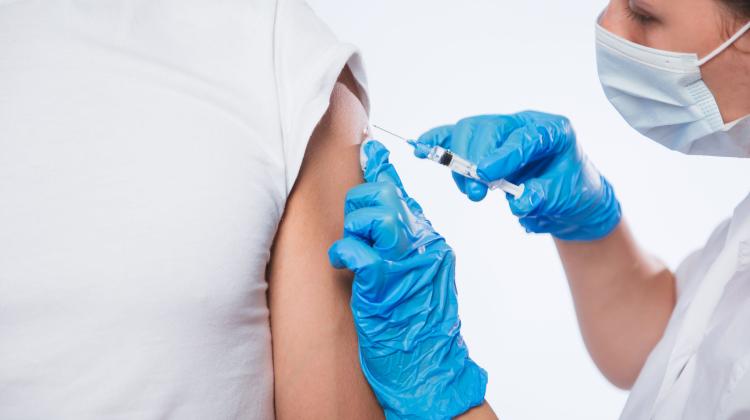Polish Chemists Show How to Cheaply Synthesize Drug Used in Treatment of COVID-19
 Professor Bartosz Grzybowski receives the ASPIRE award for research on computer planning of non-addictive analgesics at the National Institutes of Health (NIH) in Washington (October 2019).
Professor Bartosz Grzybowski receives the ASPIRE award for research on computer planning of non-addictive analgesics at the National Institutes of Health (NIH) in Washington (October 2019).
A team of scientists has demonstrated how it is possible to make a drug to treat COVID-19 using cheap compounds.
Professor Bartosz Grzybowski and his team at the Institute of Organic Chemistry PAS and the Ulsan National Institute of Science and Technology UNIST in South Korea, have used a programme he developed called Chematica to make the HCQ drug used in the treatment of the virus.
In February and March this year the first scientific reports appeared showing that chloroquine and hydroxychloroquine (HCQ) compounds may help in the treatment of COVID-19. These substances have been known for decades and used to treat malaria and some autoimmune diseases.
There are high hopes for HCQ, which, according to research, is less harmful to patients. Recently, however, this drug has been disappearing from pharmacies on a global scale leaving unprepared drug manufacturers struggling to keep up with the growing demand.
As the HCQ patent expired decades ago, in theory it can now be manufactured by anyone interested, leading the professor and his research team to show the world how to legally synthesize HCQ from cheap ingredients while avoiding patented chemical reactions. The scientists presented several different ways of synthesizing this compound using cheap substrates and non-patented synthetic solutions.
The researchers have now made their work available for free allowing anyone interested to use it to fight the pandemic.
To identify new drug production pathways, scientists from the Institute of Organic Chemistry PAS used the proprietary Chematica software, a powerful AI tool developed for over 20 years (first by Professor Bartosz Grzybowski in the US, and then partly in Poland). It collects and learns hundreds of thousands of types of chemical reactions and their permissible combinations, creating entire reaction pathways. In addition, it is connected to patent databases and catalogues of companies that manufacture chemical compounds.
Artificial intelligence algorithms search billions of combinations of chemical reactions and find pathways with optimal properties. As a result, a computer can find ways to synthesize a particular compound from very cheap or easily available substrates.
Grzybowski said: “This program not only knows all chemistry, but also the entire economy around chemistry. A few years ago, as part of a DARPA (the US Army innovation agency, which has been funding research on the Chematica program for many years) project, we took a few billion-dollar drugs and showed that thanks to Chematica we could circumvent patent paths used in their production and find new solutions.
“We confirmed the effectiveness of these solutions in the laboratory. It was then that companies realized then how important this tool was. And now the program is used by the largest pharmaceutical companies in the world.”
Ewa Gajewska, another key person in the development of the programme said: “If it turns out that some other drug already on the market is more effective in the treatment of COVID-19, the situation will repeat itself. Over a few days the product will disappear from pharmacies and no one will be able to keep up with demand, because nobody expects that tons of the compound will be needed.” She added that this will be another opportunity to use chemical synthesis planning software to get around the problem.
According to Professor Bartosz Grzybowski, countries should prepare emergency plans for the production of key drugs in the event of further pandemics or crises, as the US is currently doing.
Grzybowski said: “We scientists are doing everything we can to help the world deal with the coronavirus pandemic. We show our countries that science is needed. And that we must have our own latest technologies.
“Especially in Poland, where all hi-tech has been sold out, we can be defenceless. This must change quickly if we ever want to matter in the global technological arena because, unfortunately, it is also a fight for our own interests. And in the case of the coronavirus pandemic - for our health.”
PAP - Science in Poland, Ludwika Tomala
lt/ ekr/ kap/
Przed dodaniem komentarza prosimy o zapoznanie z Regulaminem forum serwisu Nauka w Polsce.



















